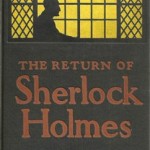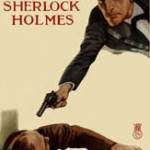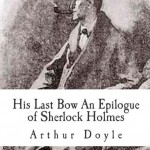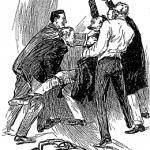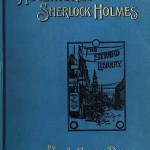“The man lived and he got off with a year. I have no doubt he is out now, but he has not dared to show his nose here. We have a cousin of his here, and I daresay he could tell you where he is.”
“No, no,” cried Holmes, “not a word to the cousin—not a word, I beg of you. The matter is very important, and the farther I go with it, the more important it seems to grow. When you referred in your ledger to the sale of those casts I observed that the date was June 3rd of last year. Could you give me the date when Beppo was arrested?”
“I could tell you roughly by the pay-list,” the manager answered. “Yes,” he continued, after some turning over of pages, “he was paid last on May 20th.”
“Thank you,” said Holmes. “I don’t think that I need intrude upon your time and patience any more.” With a last word of caution that he should say nothing as to our researches, we turned our faces westward once more.
The afternoon was far advanced before we were able to snatch a hasty luncheon at a restaurant. A news-bill at the entrance announced “Kensington Outrage. Murder by a Madman,” and the contents of the paper showed that Mr. Horace Harker had got his account into print after all. Two columns were occupied with a highly sensational and flowery rendering of the whole incident. Holmes propped it against the cruet-stand and read it while he ate. Once or twice he chuckled.
“This is all right, Watson,” said he. “Listen to this:
“It is satisfactory to know that there can be no difference of opinion upon this case, since Mr. Lestrade, one of the most experienced members of the official force, and Mr. Sherlock Holmes, the well known consulting expert, have each come to the conclusion that the grotesque series of incidents, which have ended in so tragic a fashion, arise from lunacy rather than from deliberate crime. No explanation save mental aberration can cover the facts.
“The Press, Watson, is a most valuable institution, if you only know how to use it. And now, if you have quite finished, we will hark back to Kensington and see what the manager of Harding Brothers has to say on the matter.”
The founder of that great emporium proved to be a brisk, crisp little person, very dapper and quick, with a clear head and a ready tongue.
“Yes, sir, I have already read the account in the evening papers. Mr. Horace Harker is a customer of ours. We supplied him with the bust some months ago. We ordered three busts of that sort from Gelder & Co., of Stepney. They are all sold now. To whom? Oh, I daresay by consulting our sales book we could very easily tell you. Yes, we have the entries here. One to Mr. Harker you see, and one to Mr. Josiah Brown, of Laburnum Lodge, Laburnum Vale, Chiswick, and one to Mr. Sandeford, of Lower Grove Road, Reading. No, I have never seen this face which you show me in the photograph. You would hardly forget it, would you, sir, for I’ve seldom seen an uglier. Have we any Italians on the staff? Yes, sir, we have several among our workpeople and cleaners. I daresay they might get a peep at that sales book if they wanted to. There is no particular reason for keeping a watch upon that book. Well, well, it’s a very strange business, and I hope that you will let me know if anything comes of your inquiries.”
Holmes had taken several notes during Mr. Harding’s evidence, and I could see that he was thoroughly satisfied by the turn which affairs were taking. He made no remark, however, save that, unless we hurried, we should be late for our appointment with Lestrade. Sure enough, when we reached Baker Street the detective was already there, and we found him pacing up and down in a fever of impatience. His look of importance showed that his day’s work had not been in vain.
“Well?” he asked. “What luck, Mr. Holmes?”
“We have had a very busy day, and not entirely a wasted one,” my friend explained. “We have seen both the retailers and also the wholesale manufacturers. I can trace each of the busts now from the beginning.”
“The busts,” cried Lestrade. “Well, well, you have your own methods, Mr. Sherlock Holmes, and it is not for me to say a word against them, but I think I have done a better day’s work than you. I have identified the dead man.”
“You don’t say so?”
“And found a cause for the crime.”
“Splendid!”
“We have an inspector who makes a specialty of Saffron Hill and the Italian Quarter. Well, this dead man had some Catholic emblem round his neck, and that, along with his colour, made me think he was from the South. Inspector Hill knew him the moment he caught sight of him. His name is Pietro Venucci, from Naples, and he is one of the greatest cut-throats in London. He is connected with the Mafia, which, as you know, is a secret political society, enforcing its decrees by murder. Now, you see how the affair begins to clear up. The other fellow is probably an Italian also, and a member of the Mafia. He has broken the rules in some fashion. Pietro is set upon his track. Probably the photograph we found in his pocket is the man himself, so that he may not knife the wrong person. He dogs the fellow, he sees him enter a house, he waits outside for him, and in the scuffle he receives his own death-wound. How is that, Mr. Sherlock Holmes?”
Holmes clapped his hands approvingly.
“Excellent, Lestrade, excellent!” he cried. “But I didn’t quite follow your explanation of the destruction of the busts.”
“The busts! You never can get those busts out of your head. After all, that is nothing; petty larceny, six months at the most. It is the murder that we are really investigating, and I tell you that I am gathering all the threads into my hands.”
“And the next stage?”
“Is a very simple one. I shall go down with Hill to the Italian Quarter, find the man whose photograph we have got, and arrest him on the charge of murder. Will you come with us?”
“I think not. I fancy we can attain our end in a simpler way. I can’t say for certain, because it all depends—well, it all depends upon a factor which is completely outside our control. But I have great hopes—in fact, the betting is exactly two to one—that if you will come with us to-night I shall be able to help you to lay him by the heels.”
“In the Italian Quarter?”
“No, I fancy Chiswick is an address which is more likely to find him. If you will come with me to Chiswick to-night, Lestrade, I’ll promise to go to the Italian Quarter with you to-morrow, and no harm will be done by the delay. And now I think that a few hours’ sleep would do us all good, for I do not propose to leave before eleven o’clock, and it is unlikely that we shall be back before morning. You’ll dine with us, Lestrade, and then you are welcome to the sofa until it is time for us to start. In the meantime, Watson, I should be glad if you would ring for an express messenger, for I have a letter to send and it is important that it should go at once.”
Holmes spent the evening in rummaging among the files of the old daily papers with which one of our lumber-rooms was packed. When at last he descended, it was with triumph in his eyes, but he said nothing to either of us as to the result of his researches. For my own part, I had followed step by step the methods by which he had traced the various windings of this complex case, and, though I could not yet perceive the goal which we would reach, I understood clearly that Holmes expected this grotesque criminal to make an attempt upon the two remaining busts, one of which, I remembered, was at Chiswick. No doubt the object of our journey was to catch him in the very act, and I could not but admire the cunning with which my friend had inserted a wrong clue in the evening paper, so as to give the fellow the idea that he could continue his scheme with impunity. I was not surprised when Holmes suggested that I should take my revolver with me. He had himself picked up the loaded hunting-crop, which was his favourite weapon.
A four-wheeler was at the door at eleven, and in it we drove to a spot at the other side of Hammersmith Bridge. Here the cabman was directed to wait. A short walk brought us to a secluded road fringed with pleasant houses, each standing in its own grounds. In the light of a street lamp we read “Laburnum Villa” upon the gate-post of one of them. The occupants had evidently retired to rest, for all was dark save for a fanlight over the hall door, which shed a single blurred circle on to the garden path. The wooden fence which separated the grounds from the road threw a dense black shadow upon the inner side, and here it was that we crouched.
“I fear that you’ll have a long wait,” Holmes whispered. “We may thank our stars that it is not raining. I don’t think we can even venture to smoke to pass the time. However, it’s a two to one chance that we get something to pay us for our trouble.”
It proved, however, that our vigil was not to be so long as Holmes had led us to fear, and it ended in a very sudden and singular fashion. In an instant, without the least sound to warn us of his coming, the garden gate swung open, and a lithe, dark figure, as swift and active as an ape, rushed up the garden path. We saw it whisk past the light thrown from over the door and disappear against the black shadow of the house. There was a long pause, during which we held our breath, and then a very gentle creaking sound came to our ears. The window was being opened. The noise ceased, and again there was a long silence. The fellow was making his way into the house. We saw the sudden flash of a dark lantern inside the room. What he sought was evidently not there, for again we saw the flash through another blind, and then through another.
“Let us get to the open window. We will nab him as he climbs out,” Lestrade whispered.
But before we could move, the man had emerged again. As he came out into the glimmering patch of light, we saw that he carried something white under his arm. He looked stealthily all round him. The silence of the deserted street reassured him. Turning his back upon us he laid down his burden, and the next instant there was the sound of a sharp tap, followed by a clatter and rattle. The man was so intent upon what he was doing that he never heard our steps as we stole across the grass plot. With the bound of a tiger Holmes was on his back, and an instant later Lestrade and I had him by either wrist, and the handcuffs had been fastened. As we turned him over I saw a hideous, sallow face, with writhing, furious features, glaring up at us, and I knew that it was indeed the man of the photograph whom we had secured.
But it was not our prisoner to whom Holmes was giving his attention. Squatted on the doorstep, he was engaged in most carefully examining that which the man had brought from the house. It was a bust of Napoleon, like the one which we had seen that morning, and it had been broken into similar fragments. Carefully Holmes held each separate shard to the light, but in no way did it differ from any other shattered piece of plaster. He had just completed his examination when the hall lights flew up, the door opened, and the owner of the house, a jovial, rotund figure in shirt and trousers, presented himself.

